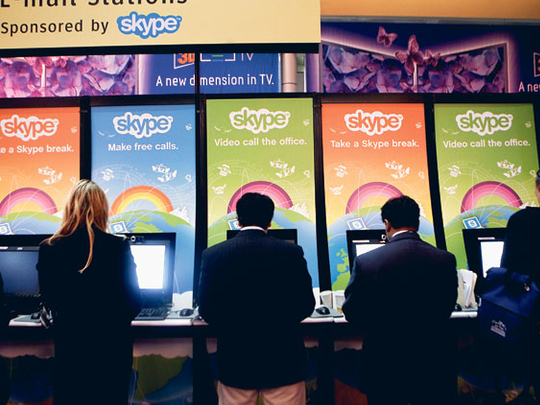
Skype, the most popular voice-over-internet telephone service in the world, is blocked in the UAE. The country joins Saudi Arabia, Paraguay, Belize and about two dozen other nations that block the service.
In the UAE, the Skype website cannot be accessed, so its software can't be downloaded. Users who have downloaded Skype outside of the country can use the software in the UAE to make calls to other Skype users, but calls from a computer to a telephone number don't go through.
According to the UAE's Telecommunications Regulatory Authority, Skype and other Voice over Internet Protocol (VoIP) systems are considered telecommunications services that are subject to regulation and licensing.
Many observers note that the Skype block also ensures that the state-owned telecom company etisalat retains control of lucrative long-distance charges.
One should note, by the way, that revenues from etisalat bene-fit all UAE residents because half their profits (Dh1.8 billion in the most recent quarter) go to the federal budget. Anyone who enjoys not paying taxes in the UAE should thank etisalat for helping subsidise the federal budget.
Still, the blocking of Skype seems to be a widely disdained practice — particularly with the large expatriate community who would like to use the service legally to speak to relatives and friends back home. From time to time, expatriates get excited at the prospect that the government may lift the Skype ban.
This happened last week following comments made by Mohammad Al Ganem, Director-General of TRA, during a one-hour Q&A session on the Twitter platform.
Users could tweet questions to Al Ganem and he responded to many inquiries, including a query about whether Skype would ever be unblocked. Al Ganem responded that Skype would be unblocked as soon as the company applied for a telecom licence in the UAE.
"It is purely a licensing matter," he said. "I hope they come to TRA for a licence."
Catch-22 situation
The only problem with this position is that Skype is never going to apply for a licence to operate in the UAE, because Skype doesn't apply for licences to operate anywhere. That's why it's free. Users simply download the software and start making calls.
Most governments don't interfere with this process — Skype hasn't had to apply for any licences to operate in the 150 countries where it's not blocked. Quite simply, Skype will continue to not work in the UAE until the TRA decides to revise its position on the regulation of VoIP services.
Given the evolution of technology, perhaps it's time the TRA did revise its position.
Google recently launched its Hangout service that allows people to easily use their Gmail accounts to talk and video chat with multiple users. Google even allows users to easily make computer-to-telephone calls for a small fee. The social networking site Facebook also offers free video chatting as part of its service.
Apple's iPhones and iPads contain an app called FaceTime that also enables video chatting. FaceTime isn't offered locally (perhaps because of overly cautious self-regulation) but works perfectly on phones purchased outside of the region.
The TRA hasn't yet acted to block these services. Perhaps the reason they're holding back is an acknowledgement of the general direction of technological advancement.
Over the broad course of history, improved technology has always led to more productivity and lower expenses. Trying to set up a barrier to this grand flow can appear futile and shortsighted.
Hopefully the TRA will eventually re-evaluate their blocking of Skype — particularly in light of the unblocked options — and drop this approach altogether.
In the meantime, expatriates should simply look into the freely available alternatives.
Dr Matt J. Duffy teaches communication law at Zayed University in Abu Dhabi. You can follow him on Twitter: @mattjduffy










